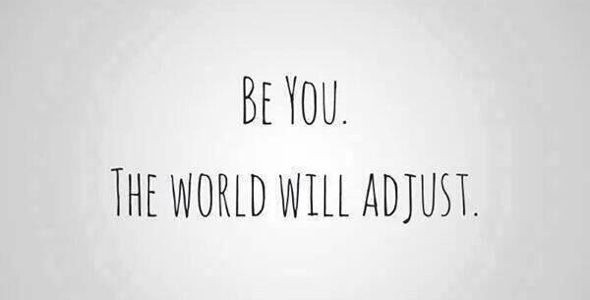Do you find it hard to be yourself at times? Do you sometimes behave like someone you’re not because you’re afraid of being rejected, or worried about what someone might think of you, or perhaps you’re not comfortable with a particular part of yourself? It could be as simple as giving someone the impression that you’re into hiking when actually, you’re not. Or ordering the lentil soup when you really want a steak.
We all long to be accepted by others, but when we’re not being our authentic selves we can feel disconnected, and over time we can become depressed or anxious and it can impact on our self-esteem.
Psychologists, Kernis and Goldman, have found that people who scored high on authenticity reported more satisfying relationships, as well as a stronger sense of self-worth and purpose. Being our authentic self is about getting to know, and getting comfortable with, our internal world.
While we know there are many benefits to being authentic, let’s face it, it’s not always easy to do. Life is complex and we often have competing feelings and goals to contend with. For example, do we voice our frustration with our boss when it could mean losing our job? We want to let them know that we feel something isn’t fair but we don’t know how they’re going to react, and we want the security of a job. These competing realities take time to work through and resolve. The better we know ourselves, the more likely we are not to react, but to think through the situation in a thoughtful manner.
Get to know your authentic self
At some point in our lives, we might ask the question ‘who am I?’ Getting to know our authentic self involves becoming aware of how we think and feel about things, as well as what motivates, or holds us back from doing things. Most of us run on automatic pilot throughout the day. We keep very busy ‘doing’ life rather than taking some time for ourselves to just ‘be’.
When we let ourselves pause for a moment and become mindful of the present moment, we can ask ‘what’s going on for me right now, how am I feeling’? This can be very helpful particularly when we have a strong reaction to something.
One way to practice this is to unplug the electronics for a few minutes every day and check in with yourself. What am I feeling now? Is there anything I need?
The more we practice doing this, the easier it is to be aware of what’s going on for us internally. I’m not suggesting that we spend hours in our own world, as this would be another form of disconnection, but that we just get to know ourselves from a compassionate place.
Accept that you’re not perfect
We don’t always sit comfortably with what we’re thinking or feeling, or what we’ve done, particularly if it’s not in line with how we see ourselves or how we would like to be.
But instead of judging, denying or defending the thought or behaviour, try to let yourself just notice it and then if you can, try to understand where it’s coming from. Sometimes our strongest reactions come from something unresolved in our history. If you find yourself reacting to things a lot, and it’s impacting on your relationships, mood or self-esteem, then it might be useful to talk to a psychologist about it.
The thing to remember is that we’re not perfect, and at some point it’s useful to get comfortable with the parts of ourselves we like, as well as those we don’t. When we’re more comfortable in our own skin, we’re more able to bring about change: ‘It’s okay that I sometimes get anxious. I wonder why I’m sometimes like that’? Accepting that we’re not perfect and that we all have limitations can be freeing.
Saying what you feel
Some of us find it difficult to talk to others about our thoughts and feelings because we don’t want to bother them, we’re anxious about hurting them or we’re afraid of losing them. We might be self-conscious or worried about what people think of us.
While it can be difficult, when we’re more comfortable with ourselves, we’re usually more able to share ourselves with others. This can lend itself to building deeper, more satisfying and more intimate relationships. When we allow ourselves to be vulnerable with someone, it opens the door for the other person to do the same.
It can be useful to build trust in relationships in small steps rather than over-sharing too early. This might be achieved through disclosing something about who you are or how you feel about something. Or it could be as simple as being okay with feeling sad or angry, or telling someone you like that you, well, like them. Most of us want to be in relationship with someone we can be ourselves with. We all want to feel accepted and loved for who we are, not someone we’re pretending to be.
Accepting you can’t control how people will respond to you
Becoming authentic is about being in touch with what’s really going on for us at any given time, getting comfortable with it, and then deciding if it’s something that you want to share or if indeed, need to share with someone else. How that’s received, is another question as it depends on many factors including how we share, with whom, and where they’re at. We need to be prepared that being true to ourselves may not elicit the response we might hope for, or that people may indeed reject us in some way. These things are beyond our control.
Self acceptance and growth
Being authentic isn’t about being insensitive to other people’s feelings. Saying unkind things in the name of ’just being honest’ does not typically arise from the authentic self, but from the reactive unresolved part of oneself that can be defensive or lacking boundaries for example. Being authentic is about getting to the truth of who we are and being able to distinguish what’s our stuff and what’s someone else’s.
It’s important to remember, growth is more likely when we see ourselves from a kind and compassionate place, not when we’re hard on ourselves. A counsellor can sometimes help that process.
If you like my posts and would like to see more, connect with me on Facebook and Twitter.
Maria Scoda is a psychologist in Sydney CBD.
This post is for informational purposes. It does not address people’s individual circumstances or needs and it is not a substitute for professional help. Please see a health care professional if you are struggling. External links have been provided for convenience. They are created and maintained by other organisations and I cannot control or guarantee the accuracy, relevance, timeliness, or completeness of this outside information.





No Comment